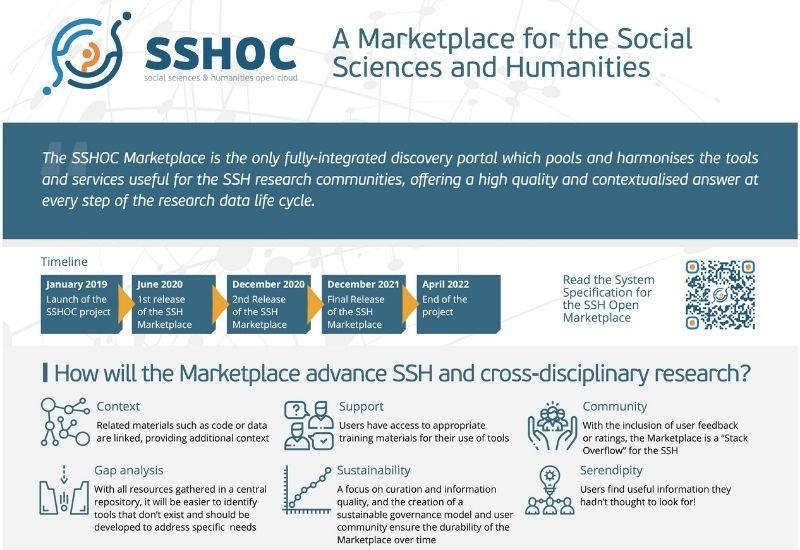
- Social Sciences & Humanities Open Cloud
A Marketplace for the Social Sciences and Humanities
A Marketplace for the Social Sciences and Humanities
One of the SSHOC project’s core objectives is to foster the transition from the current Social Sciences and Humanities landscape into a cloud-based infrastructure, that will operate according to the FAIR principles, offering access to research data and related services adapted to the needs of the SSH community. Furthermore, the tools, services, repositories and other resources brought in by project partners or generated during the course of the project will be featured in the SSH Marketplace.
The SSH Marketplace is contributing to the establishment of EOSC through several aspects:
- First of all, the SSH Marketplace offers a bridge between the EOSC and the SSH community - namely any SSH researcher and the supporting staff. This connexion has been thoughtfully prepared through the definition of its state of the art and user requirements specification. The research infrastructures (RI) involved in the SSHOC project have defined this objective through multiple exchanges with this very community. The agile and User Centered Design approaches are essential to better understand the end-users from the beginning: to better apprehend their expectations, understandings, but also fears regarding the broader European context within which the SSH Marketplace fits in. Indeed, how to better think the connexion between the community targeted through the different EOSC related Horizon 2020 projects and this very environment than by directly engaging with the future users? Aside from this user-centric approach, we also consult and rely on other expertises: national decision-makers, service providers, and other professional users. As such, this SSHOC project objective and result can be an input for the Landscape EOSC WG regarding the SSH research communities: like EOSC itself, the SSHOC project’s outputs are being shaped, thought and created by and for the research communities.
- Secondly, the SSH Marketplace adopts a process-oriented approach centered around the research workflows and practices, contextualising and interrelating datasets, tools, and services with tutorials, links to training material, user stories, showcases, and other relevant information. In other words, it will offer “contextualised solutions”. Let’s imagine that a researcher needs to perform a textual analysis on historical texts; the SSH Marketplace will offer not only software and services suitable for the task, but also tutorials explaining how to properly use the software, as well as academic articles, as well as other sources of scholarly information dealing with given task. Not only does this platform will offer a “contextualised solution” but thanks to the curation process, the quality of the content will be guaranteed.
- Last but not least, this SSH Marketplace shapes as one of the EOSC digital marketplaces, dedicated to SSH domain and focuses on a wide-access mode. Based on an iterative development process, its first release is planned for June 2020, followed by a second one in December 2020, before the final version one year after. The SSH Marketplace will be fully interoperable with the EOSC Marketplace. It aims to make use of EOSC Federating Core, especially the Federated Identity (AAI) services and the Helpdesk. A task force with relevant projects is set up to exchange and harmonize views on common themes and foster the contact with other European and international organizations operating in the EOSC. A specific attention will be paid to the OpenAire initiative and the possibility to relate to its catalogues. The SSH Marketplace can rely for the interoperability issues on the Data and Metadata Interoperability Hub being developed within SSHOC. This work can be seen as an input for the EOSC Architecture WG.
How will the Marketplace advance SSH and cross-disciplinary research?
- Context: related materials such as code or data are linked, providing additional context;
- Support: users have access to appropriate training materials for their use of tools;
- Community: with the inclusion of user feedback or ratings, the Marketplace is a “Stack Overflow” for the SSH;
- Gap analysis: with all resources gathered in a central repository, it will be easier to identify the tools that don’t exist and should be developed to address specific research needs;
- Sustainability: a focus on curation and information quality, and the creation of a sustainable governance model and user community ensure the durability of the Marketplace over time;
- Serendipity: users find useful information they hadn’t thought to look for!
Authors: Laure Barbot; Clara Petitfils; Matej Ďurčo

